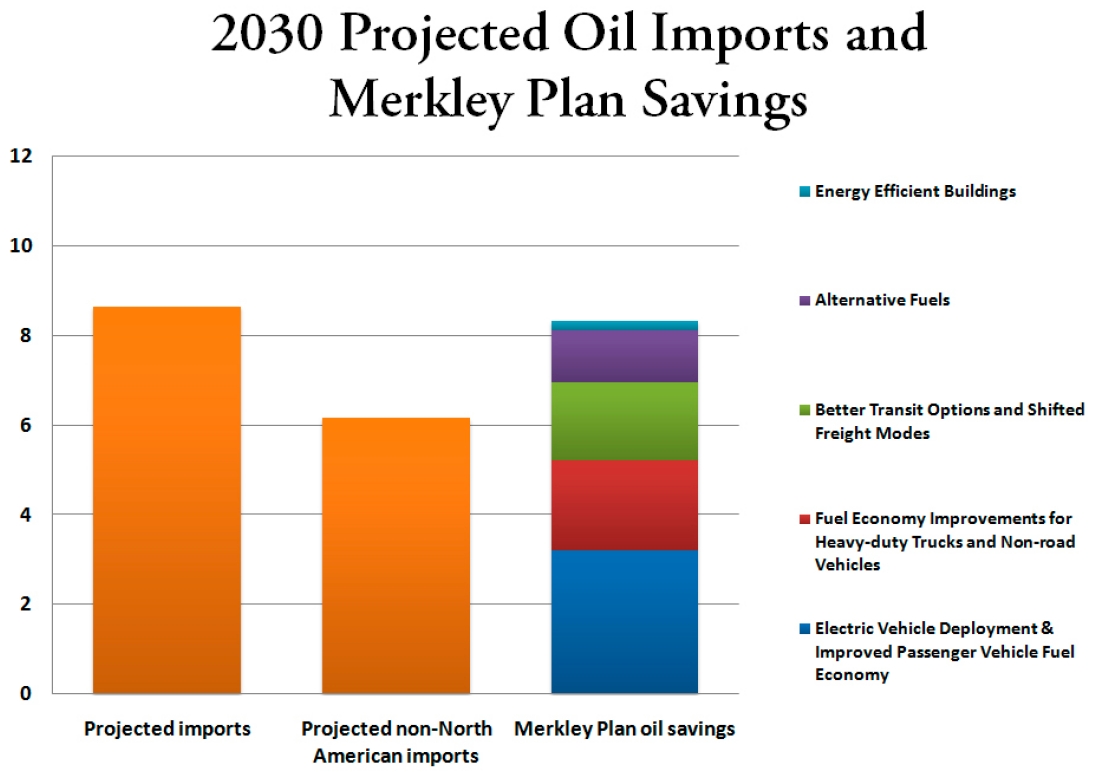This morning Sen. Jeff Merkley will introduce “America Over a Barrel: Solving Our Oil Vulnerability” (PDF) [UPDATE: video below], a policy plan devoted to reducing oil use, at an event at the Center for American Progress. I think it could make a big difference in the debate. To understand why, let’s back up and have a look at where things stand now on climate/energy legislation.
Last week I wrote about the top five things to watch as d-day for legislation approaches. Now three of them have happened. The Murkowski resolution was voted down, but by a small enough margin that it didn’t determine things one way or the other. Reid met with the Senate committee chairs, but there were intractable disagreements and no decisions were made. Lugar introduced his bill, and Lindsey Graham jumped behind it, giving the “energy-only” forces a big push. Obama’s still making the right noises about “comprehensive” legislation, but behind the scenes he and Rahm are putting together a back-up energy-only package. And public anger over the spill doesn’t seem to be directing itself toward climate pollution.
Long story short, things are looking extremely grim for a cap on carbon. (The New York Times’ John Broder says: “probably not.”) It’s up to Reid to pull together a bill out of the many proposals now floating around. My guess is, he heard from Baucus and Bingaman last week that a cap-and-trade proposal can’t pass. He’s meeting with the full Dem caucus this week and he’s likely to hear the same thing, at least from the “centrists” whose votes will make the difference. Right now Obama and the Dems badly need to do something to address the oil spill, and they no doubt fear that a carbon cap would just bog the bill down in gridlock. There is, in other words, virtually no significant political force pushing to include a carbon cap. Just, you know, environmentalists. Oh, and the voices of America’s future generations as they cry out in judgment of our cowardice and myopia.
The question is: if Reid reverts to an energy-only bill as expected, where is he going to get his energy ideas?
Right now there are two main contenders: the bill passed through Bingaman’s Energy Committee, last year, ACELA, and Lugar’s new bill. I haven’t seen an apples-to-apples comparison of those bills yet to make a judgment on which is worse, but suffice to say, neither is particularly good. According to the Union of Concerned Scientists, neither bill would yield any more renewable energy than business as usual. Their energy efficiency provisions are a pale shadow of what they could be. And they both go criminally easy on oil and coal. If Reid abandoned a cap and then ended up with a weak energy vehicle cobbled together from these two clunkers, it would be a tragedy on top of a tragedy.
That’s why it’s good that Merkley’s putting his ideas on the table. What’s needed right now are strong progressive energy proposals. If Reid’s going to do energy, he might as well do it right.
Merkley’s proposals are all focused on oil, and for now that’s probably the right strategic play. (If there’s anywhere Reid will be feeling bold, it’s on oil.) His plan would radically ramp up electric vehicle deployment, create ambitious 2030 fuel efficiency goals for vehicles and heavy trucks, ramp up production of advanced biofuels, and shift some heavy trucks to natural gas. Those are all, while ambitious, fairly familiar goals. Added on are some more interesting and overdue progressive initiatives: reform land use to serve people rather than cars, shift freight from trucks to rail and ship, and reduce the use of heating oil in homes through efficiency retrofits.
Perhaps most intriguingly, Merkley suggests the creation of a National Council on Energy Security, similar to the National Economic Council, located in the office of the president. The NCES would insure that energy goals don’t get lost from administration to administration. They would monitor progress, determine whether things could be moving faster, and make recommendations to the President and Congress. This, more than anything else, would count as elevating oil reduction to genuine national priority.
Here’s the reductions and where they would come from:

Of course there’s no guarantee Reid will use any of these ideas. But at least some bold ideas on oil are on the table now, something for progressives to rally around.
What I’d really like to see are a similar bill focused on saving electricity (with a tough EERS) and yet another focused on building out renewable energy (with a tough RES). Those are the two other crucial areas of energy policy, and they too are lacking in ambitious proposals. They’ve repeatedly been watered down in exchange for a cap!
It’s too bad Merkley is virtually alone in pushing genuinely progressive energy policy in the Senate. He can’t do all this stuff himself. Wouldn’t it be nice if a few of the body’s elder statesmen, perhaps with more seniority and committee power, backed him up? Wouldn’t it be nice to have more actual Democrats in the Senate? Sigh.
Anyway, if we’re going to abandon climate responsibility for an energy-only cop out — a disastrous decision that nonetheless looks more and more likely — then let’s get serious about energy. Surely we can manage that much.
——
UPDATE: Here’s video of the event at CAP this morning:



